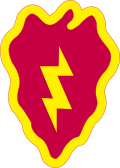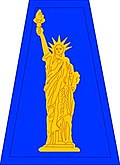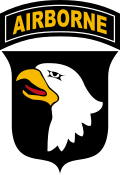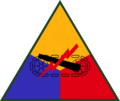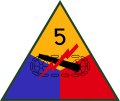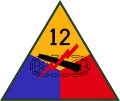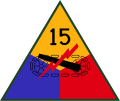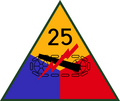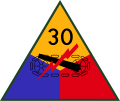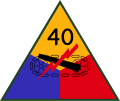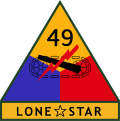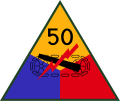Airborne/infantry
Note: several insignia are of World War II formations.
Note: US infantry divisions were not formed under the following numbers: 53, 54, 56, 57, 58, 60, 64, 67, 68. [4] [5]
- 1st Infantry Division "Big Red One" [6]
- 2nd Infantry Division "Indianhead" [6]
- 3rd Infantry Division "Marne Division" [6]
- 4th Infantry Division "Ivy Division" [6]
- 5th Infantry Division "Red Diamond" [6]
- 6th Infantry Division "Sightseeing Sixth" [6]
- 7th Infantry Division "Bayonet" [6]
- 8th Infantry Division "Pathfinder" [6]
- 9th Infantry Division "Old Reliables" [6]
- 9th Airborne Division Fourteenth Army "phantom" unit
- 10th Division
(Regular Army/National Guard unit of 1918–19) - 10th Mountain Division "Climb to Glory" Division Formerly "10th Light Division (Alpine)" [World War II]
10th Infantry DivisionJune 1948 - June 1958 - 11th Infantry Division
"Lafayette Div"
(Regular Army/National Guard 1918–19; distinct from National Guard 11th Division) - 11th Airborne Division "Angels" [6]
- 11th Infantry Division Fourteenth Army "phantom" unit
- 13th Airborne Division 1943-1946 "Unicorn" Division
- 14th Infantry Division 1918-1919 "Wolverine" Division
- 14th Division
(National Guard WWI—distinct from Regular Army 14th Division) - 17th Infantry Division Fourteenth Army "phantom" unit
- 17th Airborne Division "Golden Talons" Division
- 18th Division
(Regular army/National Guard WWI—distinct from National Guard 18th Division) - 18th Airborne Division "phantom" unit
- 21st Airborne Division Fourteenth Army "phantom" unit
- 22nd Infantry Division "phantom" unit (Used in Middle East)
- 23rd Infantry Division "Americal"
- 24th Infantry Division "Victory Division" [6]
- 25th Infantry Division "Tropic Lightning" [6]
- 26th Infantry Division "Yankee" [6]
- 27th Infantry Division "New York" Division
- 28th Infantry Division "Keystone" [6]
- 29th Infantry Division "Blue and Gray" [6]
- 30th Infantry Division "Old Hickory" Division
- 31st Infantry Division "Dixie Division"
- 32nd Infantry Division "Red Arrow" [6]
- 33rd Infantry Division "Prairie" [6]
- 34th Infantry Division "Red Bull" [6]
- 35th Infantry Division "Santa Fe" [6]
- 36th Infantry Division "Arrowhead" [6]
- 37th Infantry Division "Buckeye" [6]
- 38th Infantry Division "Cyclone" [6]
- 39th Infantry Division "Delta Division"
- 40th Infantry Division "Sunshine Division" [6]
- 41st Infantry Division "Jungleers" Division
- 42nd Infantry Division "Rainbow" [6]
- 43rd Infantry Division "Winged Victory" Division
- 44th Infantry Division "Prepared In All Things Division"
- 45th Infantry Division 1924–1939
- 45th Infantry Division "Thunderbird" [6] 1939–1953
- 46th Infantry Division Operation Wadham "phantom" unit
- 46th Infantry Division "Iron Fist" Division1947–1968
- 47th Infantry Division "Viking Division"
- 48th Infantry Division Operation Quicksilver (US Phantom Division WW2)
- 49th Infantry Division "Argonauts"
- 50th Infantry Division "phantom" unit
- 52nd Infantry Division(52nd SSI changed to 49th Division in 1947)
- 55th Infantry Division Fourth British Army "phantom" unit
- 63rd Infantry Division "Blood and Fire" [6]
- 65th Infantry Division "Battle-Axe" Division
- 69th Infantry Division "Fighting Sixty-Ninth" Division
- 70th Infantry Division "Trailblazers" [6]
- 71st Infantry Division "The Red Circle" Division
- 75th Infantry Division "Make Ready" Division
- 76th Infantry Division "Onway/Liberty Bell" Division
- 77th Infantry Division "Statue of Liberty" [6]
- 78th Infantry Division "Lightning" [6]
- 79th Infantry Division "Cross of Lorraine" [6] Division
- 80th Division "Blue Ridge" [6] Division
- 81st Infantry Division "Wildcat" [6]
- 82nd Airborne Division "All American" [6]
- 83rd Infantry Division "Thunderbolt" [6]
- 84th Infantry Division "Railsplitters" [6]
- 85th Infantry Division "Custer" [6]
- 86th Infantry Division "Blackhawk Division"
- 87th Infantry Division "Golden Acorn" [6]
- 88th Infantry Division "Fighting Blue Devils/Clover Leaf Division"
- 89th Infantry Division "Rolling W" Division
- 90th Infantry Division "Tough 'ombres" [6]
- 91st Infantry Division "Wild West Division" [6]
- 92nd Infantry Division "Buffalo Soldiers" Division
- 93d Infantry Division "Blue Helmets" Division
- 94th Infantry Division "Neuf Cats" Division1923–1942; 1956–1967
- 94th Infantry Division "Neuf Cats" Division1942–1956
- 95th Infantry Division "Iron Men of Metz" [6]
- 96th Infantry Division "The Deadeye Division"
- 97th Infantry Division "Trident" Division
- 98th Infantry Division "Iroquois" [6]
- 99th Infantry Division "Checkerboard Division"
- 100th Division "Century" [6]
- 101st Airborne Division "Screaming Eagles" [6]
- 102nd Infantry Division "Ozark" [6]
- 103rd Infantry Division "Cactus Division" [6]
- 104th Infantry Division "Timberwolf" Division
- 106th Infantry Division "Golden Lions" Division
- 108th Division "Golden Griffins" Division
- 119th Infantry Division Operation Wedlock "phantom" unit
- 130th Infantry Division (US Phantom Division WW2)
- 135th Airborne Division"phantom" unit
- 141st Infantry Division (US Phantom Unit WW2)
- 157th Infantry Division (US Phantom Unit WW2)































